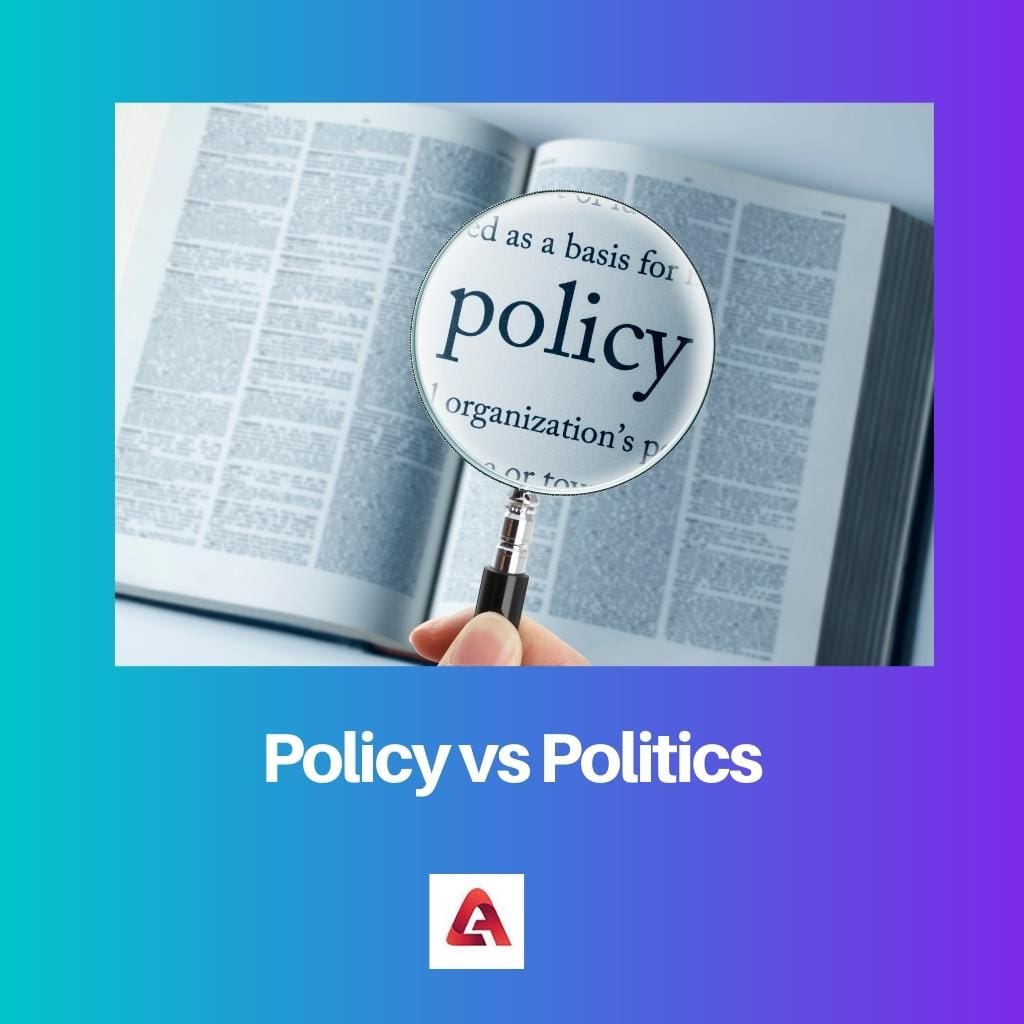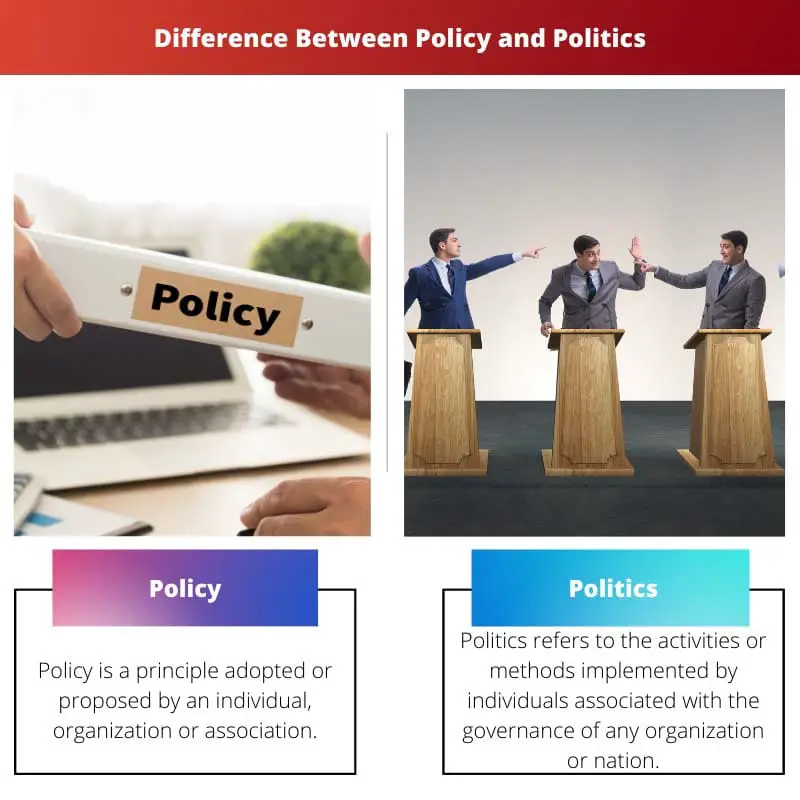Every organization has one main motive of becoming the best and better. For the purpose of achieving this goal, an organization or even individuals adhere to different policies.
These policies help them in making decisions. Along with policies, there are different ways adopted in implementing, which involve Politics.
Key Takeaways
- Policy refers to guidelines or principles implemented by an organization or government. In contrast, politics refer to the activities associated with the governance of a country or area, especially the debate between parties having power.
- Policy results from the political process, while politics is the policy-making process.
- The policy is created to address specific issues or problems, while politics is associated with gaining and maintaining power.
Policy vs Politics
The policy can be guidelines provided by the government or a corporation. Different businesses or organizations can have different policies. Policies are made to create a structured environment in a particular organization. Politics are activities performed by the government. It is linked with decision-making. Politics define power.

Policy refers to certain courses, principles, or rules and regulations which have been adopted in the past or proposed by any individual, group, organization, or nation.
It is mandatory for every individual who is a part of the involved organization or area to accept and follow these Policies.
Politics refers to certain methods or activities implemented to govern any group, organization, or nation. There is no set of rules or methods that need to be adopted in Politics.
It completely depends on the organization, association, situation, and last but not least- the choice of the individuals.
Comparison Table
| Parameters of Comparison | Policy | Politics |
|---|---|---|
| Meaning | Policy is a principle adopted or proposed by an individual, organization or association. | Politics refers to the activities or methods implemented by individuals associated with the governance of any organization or nation. |
| Reference | Policy refers to a plan or guide. | Politics refers to authority or Power. |
| Activity | It is a set of Principles. | It is the process of implementing various policies. |
| Existence | They exist as a piece of document. | It is exercised by people. |
| Phenomenon | It mostly involves Theory. | It mostly involves Practice. |
What is Policy?
In simple terms, a Policy is a certain course, principle, or action which has been adopted previously or proposed by an individual, association, or organization.
Policies display a certain sense of commitment to a particular purpose. These policies must be accepted and followed by every individual who is part of that particular association, organization, or nation.
The term derived its name from “Policie”- an Old French word, “politia”- a Late Latin word, and “politeia”- an Ancient Greek.
The policy is a purposeful and intended system of principles to guide several public sector organizations and groups, government, or even individual decisions and achieve cogent results.
Policies are a statement of intent which are meant to be put into action or implemented during a specific period. These policies are meant for protection and punishment overall betterment of a particular organization.
Policy study refers to the process of generating new policies, focusing on important decision-making, planning, setting goals, and searching for alternative plans or policies. Policies are important for development.
This is why it is more important than a policy is important. In a democracy, certain policies can be revoked by signing petitions and taking necessary actions.

What is Politics?
Simply put, Politics are a set of activities associated with the decision-making process. This process takes place in groups and several types of power connections between individuals, like settlements and acquisitions.
The term politics is used in reference to Authority or Power and also Political Solutions.
A ‘Political Solution’ is a method that involves nonviolence, bargaining and compromise. This is a solution that authority or both parties come up with to avoid feud, violence, and further loss.
The solution is beneficial to both parties. Politics is nearly a part of every social association on all social levels.
Be it friends, family, workplace, group, state, country, or a global platform. A wide range of options, techniques, and methods are used in politics. Some of them may not even be the correct ones.
It also involves the promotion of one’s own political views with other people on various subjects. Every political party has its own motive, agenda, opinions, and ideas.
Politics is the execution of a plan. It depends on the individual or organization how to carry out the plan. Politics is an organizational process and an inextricable part of the government system. It is defined as a science or art of governing or government.

Main Differences Between Policy and Politics
- A policy is a principle adopted or proposed by an individual, organization, or association. Whereas, Politics refers to the activities or methods implemented by individuals associated with the governance of any organization or nation.
- Policy refers to a plan or guide mapping the directions. Politics refers to authority or power, including public life.
- A policy is a set of Principles. And, Politics is an organizational process including the implementation of various policies and mind games.
- Policies are in existence in the form of paper. On the contrary, politics is carried out by individuals.
- A policy is a supposition or a system of ideas meant to explain a certain idea or concept, basically involving principles. Politics involves engaging in social activities by implementing principles and strategies.

- https://www.aeaweb.org/articles?id=10.1257/aer.90.4.847
- https://www.klshistory.co.uk/uploads/1/1/0/4/110471535/what_is_politics.pdf

This article provides a clear understanding of the core differences between policy and politics. The real-world examples are insightful.
I found the section on policy study to be particularly informative. It underscores the importance of policy development.
The historical etymology of ‘policy’ and ‘politics’ is fascinating. It provides insightful context to both concepts.
I agree. It enriches our understanding of policy and politics.
Absolutely, understanding the origin of these words adds depth to their meaning and relevance.
The importance of policy development and its impact on decision-making is well-articulated in this article.
The article presents an in-depth analysis of policy and politics, emphasizing their roles and significance. Very informative.
The explanation of the main differences between policy and politics is succinct and illuminating. The article is very informative overall.
Wonderful insights on the differences between policy and politics. It’s important to understand both concepts and their relationship in governance.
I couldn’t agree more. The article provides a comprehensive explanation of policy and politics.
The comparison table is particularly helpful in understanding the key differences between policy and politics.
Great article! Both policy and politics are crucial for understanding the governance of any organization or nation.
The article effectively highlights the significance of policy and politics in governance. The comparison table is a useful tool for understanding the distinctions.
This article effectively highlights the importance of policies and politics. Well done!
The section on ‘What is Politics?’ delves deeply into the multifaceted aspects of political activities. It’s thought-provoking.
Absolutely, it provides an insightful perspective on the role of politics in conflict resolution.
I particularly found the explanation of ‘political solutions’ to be enlightening.